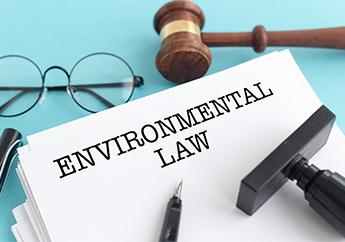
Missouri’s air, land and water resources play an important role in our health and are essential to the environmental and economic vitality of our state. The Missouri Department of Natural Resources aspires to help Missouri citizens thrive by balancing a healthy environment with a healthy economy. By protecting our resources, we safeguard a sustainable future for our neighbors, our children and ourselves. By promoting sustainable environmental practices, we support economic development opportunities throughout the state. Ultimately, this improves the overall quality of life for Missouri citizens.
The main goal of the department’s compliance and enforcement teams is to achieve regulatory compliance with environmental laws at Missouri's regulated facilities and sites. Compliance and enforcement staff work with the regulated community and the general public to ensure compliance with environmental laws. When problems do occur, compliance and enforcement staff offer technical assistance and compliance assistance to resolve the problems as fast and effectively as possible. The department’s actions ensure a level playing field for those dealing with pollutants and contaminants – no one should make a profit at the expense of the health and resources of Missouri citizens.
Compliance with Environmental Laws
The department is statutorily obligated to compel compliance with Missouri’s environmental laws, their implementing regulations and associated permits. Compliance and enforcement teams mainly achieve compliance through a process known as conference, conciliation and persuasion (CC&P), which is required by several state environmental laws. Its purpose is to encourage prompt correction of violations in a productive way. CC&P consists of verbal or written communications between authorized representatives of the department and the party in non-compliance. It also provides opportunities to handle enforcement cases through informal methods and strives to resolve any finding of non-compliance with statutes, regulations, permits or other enforceable provisions.
CC&P is a focused and time limited process that typically does not exceed 180 days to correct the violation. There are certain situations that will result in formal enforcement action within that 180 day timeframe. These scenarios include, but are not limited to:
- The violation(s) represents an imminent and serious threat to human health, public welfare or the environment
- The violation(s) appear to be intentional or result from negligence or are otherwise criminal
- Departmental rule or guidance requires immediate enforcement actions for the specific violation(s)
Enforcement Actions
If violations persists, the department must escalate actions to compel compliance, especially if the responsible party has gained substantial economic benefit as a result of non-compliance. The department will use formal enforcement actions to resolve outstanding non-compliance that could not be resolved through the informal CC&P process. Formal enforcement must be applied to address threats to human health and natural resources. Department staff continue to provide assistance to willing parties throughout the enforcement process.
Compliance and enforcement teams are authorized to use the full range of tools to compel resolution of environmental problems and deter future non-compliance with environmental laws and their implementing regulations and associated permits. These tools range from voluntary compliance agreements to civil litigation. Formal enforcement actions include, but are not limited to, suspending or revoking a permit, Abatement/ Administrative Orders and Abatement/ Administrative Orders on Consent. These actions typically require the responsible party to implement a schedule for achieving compliance at the facility or site. The actions may require paying a penalty, cost recovery or damage amounts assessed for the violations.
The department also has the option to refer a case to the Attorney General’s Office, who represents the department in legal action against a responsible party. Examples of formal enforcement actions achieved through litigation include Settlement Agreements, Consent Judgments and Court Orders. Referral to the Attorney General’s Office can occur when:
- The responsible party and the department are unable to reach an agreement to correct the violations
- The responsible party fails to comply with a formal enforcement action initiated by the department
- The violations are an imminent and serious threat to human health, public welfare or the environment
